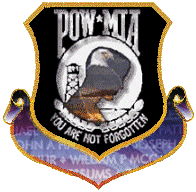|
|
Becoming a prisoner of war is an unfortunate by-product of going into
battle -- and has been since man was first able to strike a blow against
another man. Taking a person (or persons) as a prisoner of war gives the 'captor' an advantage. They possess the means for negotiating leverage as well as a resource for extracting information about anything that might be of value; often resorting to torture, starvation, exploiting emotions, and anguish to their advantage. As designated by International Law (set forth by the Geneva
Conventions) a Prisoner of War is a "member of the Armed Forces of an enemy, or
non-combatants who render their direct service and who have been captured during wartime." (Encarta Online Deluxe). Certain personnel in the medical profession, chaplains, and civilians [those not providing direct service to an Armed Force] can not be designated as a prisoner of war.
The Code of Conduct, first published by the Eisenhower Administration
on August 17, 1955 and than later amended by the Reagan
Administration in 1988, was created to give the captured American(s)
faith and hope of an expedient recovery. It was also created to give the
captured American(s) a 'standard' for conduct, organization, and
resistance. Thirdly, it was created in the interest of National Security and it's protection by the loyal subscribers of a democratic and free nation.
Just as the soldier has the responsibility to our country as provided by
this code, so to does the U.S. Government. Air Force Pamphlet 50-34,
Vol. 1 (1 Nov 92) provides that this responsibility is equally shared by
the U.S. Government. To those who become a POW -- "...the
government will use every practical means to contact, support, and gain
release for you and all other POWs."
Did this 'statement' exist during the Korean War? Probably not,
considering the Code of Conduct was not developed until two years after the war had ended.
This is not to say that our soldiers serving prior to, and during, the Korean War didn't have rules to follow in the event they were captured. A 'Code' existed in the broadest sense that dates back to the days of Concord and Bunker Hill. Did this 'statement' (or one like it) exist during the Vietnam War? Yes, as stated earlier, it was first published in 1955 and had existed in it's original form at this time.
It is undeniable that this 'statement' remains in-effect today; so
than...where are the 8,216 soldiers from the Korean War, the 1,023
soldiers from the Vietnam War, and lastly, the one soldier who remains
POW/MIA from the Gulf War? [MIA refers to 'Missing in Action' -- in
other words, not accounted for at this time.] -- not to mention the
78,000+ servicemen from WWII. According to policy, as stated above,
the United States Government is supposed to use every practical means to contact, support, and gain release for all POWs; a statement that I feel would apply to any POW/MIA, whether they are thought to be dead or alive -- it should make no difference.
|
|
|
The Code of Conduct |
I. I am an American,
fighting in the forces
which guard my country
and our way of life. I am
prepared to give my life in
their defense.
II.
I will never surrender
of my own free will. If in
command, I will never
surrender the members of
my command while they
still have the means to
resist.
III.
If I am captured, I will
continue to resist by all
means available. I will
make every effort to
escape and aid others to escape. I will accept neither parole nor special favors from the enemy.
IV.
If I become a prisoner
of war, I will keep faith
with my fellow prisoners. I
will give no information
or take part in any action
which might be harmful to
my comrades. If I am
senior, I will take command. If not, I will obey the lawful orders of those appointed over me
and will back them up in
every way.
V.
When questioned, should I become a prisoner of war, I am required to give name, rank, service number, and date of birth. I will evade answering further
questions to the utmost of
my ability. I will make no
oral or written statements
disloyal to my country and
its allies or harmful to
their cause.
VI.
I will never forget that I am an American, fighting for freedom, responsible for my actions, and dedicated to the principles which made my country free. I will trust in my God and in the
United States of America.
-AFP 50-34, Vol 1, Pg 137
|
|

